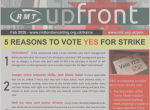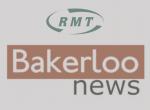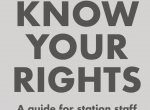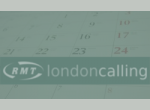Terms of reference / forum functioning
There is still confusion about how this body works and how it relates to the machineries of negotiation. The unions expressed frustration about raising equalities issues for years, only for them to sink into talking shops with no real change. Management stressed that they did not want this to happen, but when we proposed ways to address this (such as increased membership of the Forum (see below) or subgroups to work on specific issues between Forum meetings, they said they were unable to agree to this immediately because of the additional release that would be needed. They will consider it.
Management wanted union membership of the forum to be more consistent; we pointed out that this is difficult when we have just three reps, with a wide variety of equality and diversity issues to address. Similarly, management were unsure as to why equality issues were not being addressed adequately at company councils. We suggested that the unions have an additional seat each on the company councils, specifically to address equality issues.
Previous issues
Management circulated an ‘Action Tracker’ the day before the meeting. We raised:
- Name changes (which often arise from various equality-related issues): the company is still failing to update people’s name changes on SAP
- Situational Judgement Tests (SJTs): management’s response to our objection to SJTs was to point out that they would allow reasonable adjustments. However, RMT’s objection is to SJTs in general: they constitute ‘personality gatekeeping’; and the ‘reasonable adjustment’ approach requires job applicants to declare disability in advance, which many will be unwilling to do.
Anti-racism
TfL is developing an Anti-Racist Charter, and will send the unions the working document. It is also launching a new ‘Call It Out’ line, which is basically SafeLine rebranded. We argued that although it was right to challenge racist interpersonal behaviour, there must also be a strong consideration of structural racism. TfL says that it supports Black Lives Matter, but does not seem to have the focus on structural racism, in particular on policing, that BLM has. We raised the following specific issues:
- that contracting-out is structurally racist: BAME workers are contrasted in work such as cleaning, with very poor pay and conditions; contracting-out also allows people who have been sacked for racism to return to the workplace in a different guise
- that the police carry out operations on TfL/LUL premises that are racist: we have observed knife detection exercises in which only young Black and Asian men were directed through the knife arch
- that we would like the company to survey staff experiences of engagement with the police at work, and to consider the ethnic breakdown of responses
- that we would like the company to release trade union reps for anti-racist and/or equalities training, to build their skills on individual representation and on identifying and challenging structural racism.
Pay gaps
There will be a separate discussion about gender and ethnicity pay gaps.
The company recognises that one of the main causes of the gaps is that women and BAME people are over-represented in lower-paid grades and under-represented in higher-paid posts. Their answer to this is to help more women and BAME people into higher-paid posts. We pointed out that the gaps could also be reduced by reducing the pay differential between higher- and lower-paid jobs, for example by introducing a maximum wage set at, say, five times the lowest wage, and by awarding flat-rate pay rises.
Coronavirus concerns
We raised:
- provision for staff who become disabled as a result of Covid-19 infections; air quality in TfL/LUL workplaces is a particular consideration for people who develop long-term respiratory problems
- Freedom Passes for disabled people not working at some national rail stations before 09:30, in breach of policy; TfL needs to resolve this, as it affects people on Steps Into Work
- that the KPMG report into TfL financed must equality-assessed.
The other unions raised:
- that lower-paid grades are more vulnerable to Covid-19 because they are more likely to work in jobs that can not be done from home; and are more likely to work in crowded housing
- that people unable to return to work because they are clinically vulnerable are concerned about their job security
Other issues
- The Action on Equality strategy has been renamed Action on Inclusion (we sought confirmation that this did not imply that equality content was being dropped); it has been delayed by the pandemic, and no new date has been set for its publication.
- The company will be using a ‘Behavioural Science Innovation Lab’. This has also been delayed by the pandemic; we will get a further report soon.
- TfL uses ‘D&I dashboards’ to display a set of indicators of progress on workplace diversity; senior level diversity; and inclusion. Unite raised concerns about accountability and access to these dashboards.
- The company doesn’t really understand why people do not have sufficient trust in them to give them their personal equality data, and wants the unions to help identify reasons – we can certainly help with this!
Janine Booth
- 3273 reads






